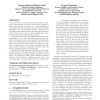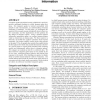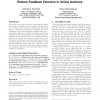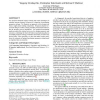271 search results - page 37 / 55 » Making games for social change |
ATAL
2009
Springer
14 years 2 months ago
2009
Springer
Current trends in model construction in the field of agentbased computational economics base behavior of agents on either game theoretic procedures (e.g. belief learning, fictit...
ATAL
2008
Springer
13 years 9 months ago
2008
Springer
Computer agents participate in many collaborative and competitive multiagent domains in which humans make decisions. For computer agents to interact successfully with people in su...
CORR
2011
Springer
12 years 11 months ago
2011
Springer
In this paper, we study methods for improving the utility and privacy of reputation scores for online auctions, such as used in eBay, so as to reduce the effectiveness of feedbac...
APPROX
2009
Springer
14 years 2 months ago
2009
Springer
An important research thread in algorithmic game theory studies the design of efficient truthful mechanisms that approximate the optimal social welfare. A fundamental question is ...
SIGECOM
2006
ACM
14 years 1 months ago
2006
ACM
Our proposed methods employ learning and search techniques to estimate outcome features of interest as a function of mechanism parameter settings. We illustrate our approach with ...




